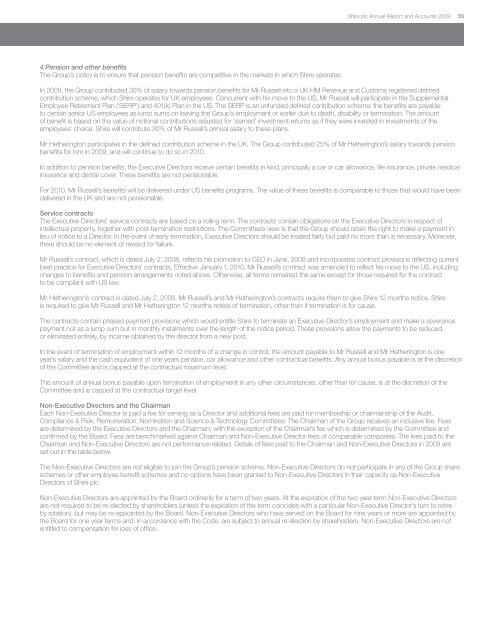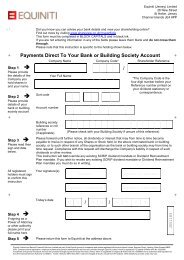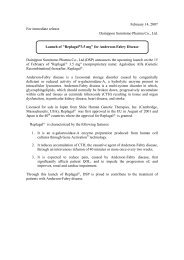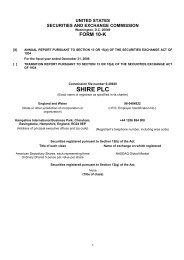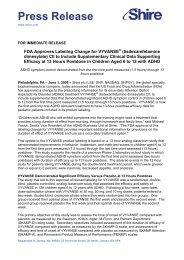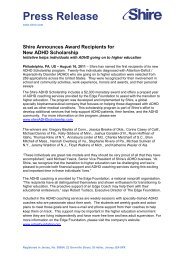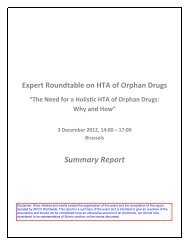7817 Annual Report 2009.qxd - Shire
7817 Annual Report 2009.qxd - Shire
7817 Annual Report 2009.qxd - Shire
Create successful ePaper yourself
Turn your PDF publications into a flip-book with our unique Google optimized e-Paper software.
<strong>Shire</strong> plc <strong>Annual</strong> <strong>Report</strong> and Accounts 2009554 Pension and other benefitsThe Group’s policy is to ensure that pension benefits are competitive in the markets in which <strong>Shire</strong> operates.In 2009, the Group contributed 30% of salary towards pension benefits for Mr Russell into a UK HM Revenue and Customs registered definedcontribution scheme, which <strong>Shire</strong> operates for UK employees. Concurrent with his move to the US, Mr Russell will participate in the SupplementalEmployee Retirement Plan (‘SERP’) and 401(k) Plan in the US. The SERP is an unfunded defined contribution scheme; the benefits are payableto certain senior US employees as lump sums on leaving the Group’s employment or earlier due to death, disability or termination. The amountof benefit is based on the value of notional contributions adjusted for ‘earned’ investment returns as if they were invested in investments of theemployees’ choice. <strong>Shire</strong> will contribute 30% of Mr Russell’s annual salary to these plans.Mr Hetherington participates in the defined contribution scheme in the UK. The Group contributed 25% of Mr Hetherington’s salary towards pensionbenefits for him in 2009, and will continue to do so in 2010.In addition to pension benefits, the Executive Directors receive certain benefits in kind, principally a car or car allowance, life insurance, private medicalinsurance and dental cover. These benefits are not pensionable.For 2010, Mr Russell’s benefits will be delivered under US benefits programs. The value of these benefits is comparable to those that would have beendelivered in the UK and are not pensionable.Service contractsThe Executive Directors’ service contracts are based on a rolling term. The contracts contain obligations on the Executive Directors in respect ofintellectual property, together with post-termination restrictions. The Committee’s view is that the Group should retain the right to make a payment inlieu of notice to a Director. In the event of early termination, Executive Directors should be treated fairly but paid no more than is necessary. Moreover,there should be no element of reward for failure.Mr Russell’s contract, which is dated July 2, 2008, reflects his promotion to CEO in June, 2008 and incorporates contract provisions reflecting currentbest practice for Executive Directors’ contracts. Effective January 1, 2010, Mr Russell’s contract was amended to reflect his move to the US, includingchanges to benefits and pension arrangements noted above. Otherwise, all terms remained the same except for those required for the contractto be compliant with US law.Mr Hetherington’s contract is dated July 2, 2008. Mr Russell’s and Mr Hetherington’s contracts require them to give <strong>Shire</strong> 12 months notice. <strong>Shire</strong>is required to give Mr Russell and Mr Hetherington 12 months notice of termination, other than if termination is for cause.The contracts contain phased payment provisions which would entitle <strong>Shire</strong> to terminate an Executive Director’s employment and make a severancepayment not as a lump sum but in monthly instalments over the length of the notice period. These provisions allow the payments to be reduced,or eliminated entirely, by income obtained by the director from a new post.In the event of termination of employment within 12 months of a change in control, the amount payable to Mr Russell and Mr Hetherington is oneyear’s salary and the cash equivalent of one years pension, car allowance and other contractual benefits. Any annual bonus payable is at the discretionof the Committee and is capped at the contractual maximum level.The amount of annual bonus payable upon termination of employment in any other circumstances, other than for cause, is at the discretion of theCommittee and is capped at the contractual target level.Non-Executive Directors and the ChairmanEach Non-Executive Director is paid a fee for serving as a Director and additional fees are paid for membership or chairmanship of the Audit,Compliance & Risk, Remuneration, Nomination and Science & Technology Committees. The Chairman of the Group receives an inclusive fee. Feesare determined by the Executive Directors and the Chairman, with the exception of the Chairman’s fee which is determined by the Committee andconfirmed by the Board. Fees are benchmarked against Chairman and Non-Executive Director fees of comparable companies. The fees paid to theChairman and Non-Executive Directors are not performance-related. Details of fees paid to the Chairman and Non-Executive Directors in 2009 areset out in the table below.The Non-Executive Directors are not eligible to join the Group’s pension scheme. Non-Executive Directors do not participate in any of the Group shareschemes or other employee benefit schemes and no options have been granted to Non-Executive Directors in their capacity as Non-ExecutiveDirectors of <strong>Shire</strong> plc.Non-Executive Directors are appointed by the Board ordinarily for a term of two years. At the expiration of the two year term Non-Executive Directorsare not required to be re-elected by shareholders (unless the expiration of the term coincides with a particular Non-Executive Director’s turn to retireby rotation), but may be re-appointed by the Board. Non-Executive Directors who have served on the Board for nine years or more are appointed bythe Board for one year terms and, in accordance with the Code, are subject to annual re-election by shareholders. Non-Executive Directors are notentitled to compensation for loss of office.


